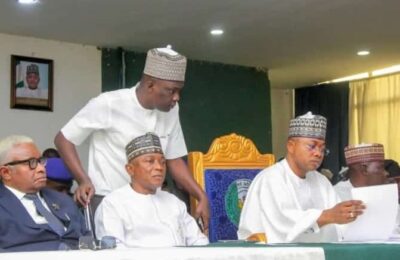In the face of dwindling oil revenue and economy downturn, the Nigerian government has learnt the hard way to diversify the economy and generate new revenue, some of the path to economic progress they’ve undertaken are VAT and stamp duty in order to generate revenue to drive the economy.
On the 14th of January, Nigeria’s President Muhammad Buhari, signed the finance bill into law, which include an increments of VAT rate from 5% to 7.5%. Some of the items excluded from VAT according to the bill includes: Unprocessed food, medical Pharmaceutical goods and services, books, magazines and educational materials all exports, plants and machinery purchased for use in the export zone, the downstream petroleum sector and the agricultural sector, services rendered by community banks and mortgage institution, plays and performance conducted by educational institutions as part of learning, proceeds from the disposal of short term federal, state local government and corporate securities and bonds (including supra natural bonds)
The Nigerian government envisaged an economic diversion that is tax driven, in accordance with international tax mechanisms, while the 7.5% rate has sparked criticism, it is evident that Nigeria has one of the lowest VAT rate in Africa and around the world. The new FIRS boss has reiterated his commitment to generate more revenue for the government through proper taxation for a more stable economy that will be resistant to external shocks.
This Increment of VAT rate has buoyed an increment of VAT revenue by 10%. According to the data published by the Nigerian Bureau of Statistics (NBS), total Value Added Tax (VAT) collected in Q1 2020 was N338.94bn, a growth of 10% when compared with N308.48bn collected in Q4 2019. Which is also the highest ever collected since NBS started publishing the data in q1 2013.
This discovery has spurred the FiRS into enforcing new tax regulations like the stamp duty. Albeit, the stamp duty act has been in place since 1939, not much of its potentials has been exploited to generate revenue for the federal government.
According to a financial analysis carried out by the federal inland revenue service it was discovered that in 2019, the total volume of chargeable and non chargeable transaction was over 52 billion, of which the total value of transaction was over 615 trillion naira. With a stamp duty of 50naira on these transactions, Nigeria is totally on its way to the bank for a huge cash out. The varied instruments which stamp duty can be charged makes it proof to external shock. Some of the instruments which it is payable includes: the chargeable transactions in the fixed duty instruments category: power of attorney (PoA), certificate of occupancy (C of O), proxy form; appointment of receiver, memorandum of understanding (MoU), joint venture agreements (JVA), guarantor’s form, and ordinary agreements receipts.
While ad-valorem instruments chargeable under the stamp duties act are: deed of assignment, sales agreement, legal mortgage or debentures, tenancy or lease agreement, insurance policies, contract agreements, vending agreement, promissory notes, charter-party and contract notes.
In addition to these instruments, any electronic receipt or electronic transfer, money deposited in any bank or with any banker or any type of account of transaction from N10,000 upwards shall attract a singular or one-off duty of the sum of N50.
In the same way, stamp duty is payable on receipt (written, printed or in electronic form) for transactions or between corporate bodies or between a corporate body and an individual, group or body of individuals, whose value amounts to N10,000 and above.
While these tax laws and stamp duties looks promising for economic growth and sustenance. the life force of the economy which are the SMEs, are bearing the heavy yoke of these taxes, with lack of electricity, SMEs have to generate their own electricity to run their businesses in order to drive the economy, VAT rates and huge stamp duties can force most of them to frizzle out. With little profit, huge taxes, lack of electricity a planned hike in electricity tariffs and an increased fuel price, many of the SMEs will have to fold up and settle for formal employment. With the pandemic tanking the economy, it maybe a bad move that may have a counter effect on the economy.
In comparison with first world economies our taxes are very low, but it is because they have the paraphernalias to run the economy. Our economic mechanism is dysfunctional because we haven’t fixed our electricity and transportation system. Apart from these mechanisms not been in place.
There is this deep cynicism that lurks beneath the subconscious mind of Nigerians when it comes to trusting their leaders, based on a history of diversion and grandiose corruption that has continued unabated, it has diminished public trust for the government.
While the public trust continues to decline, the Nigerian government whose 99% of revenue is used in servicing debt continues to look for better options to stimulate the economy. The VAT and stamp duties are goldmines that need to be harnessed. And definitely may not have too much implications on poor citizens. The federal government have committed to pressuring banks to be able to give loans to SMEs and very recently the CBN committed 50billion naira as loans for SMEs suffering the brunt of the pandemic.
While the government embarks on this initiative to build the frail and fragile economy. It is also expedient to deploy more accountability in government since the revenues that will fuel the economy will majorly come from taxpayers, many facilities need to be put in place for transparency in order to earn more public trust and to breed more unity in achieving the Nigerian dream.
– Sunday Jude Abah, a freelance journalist, wrote from Kogi state.




